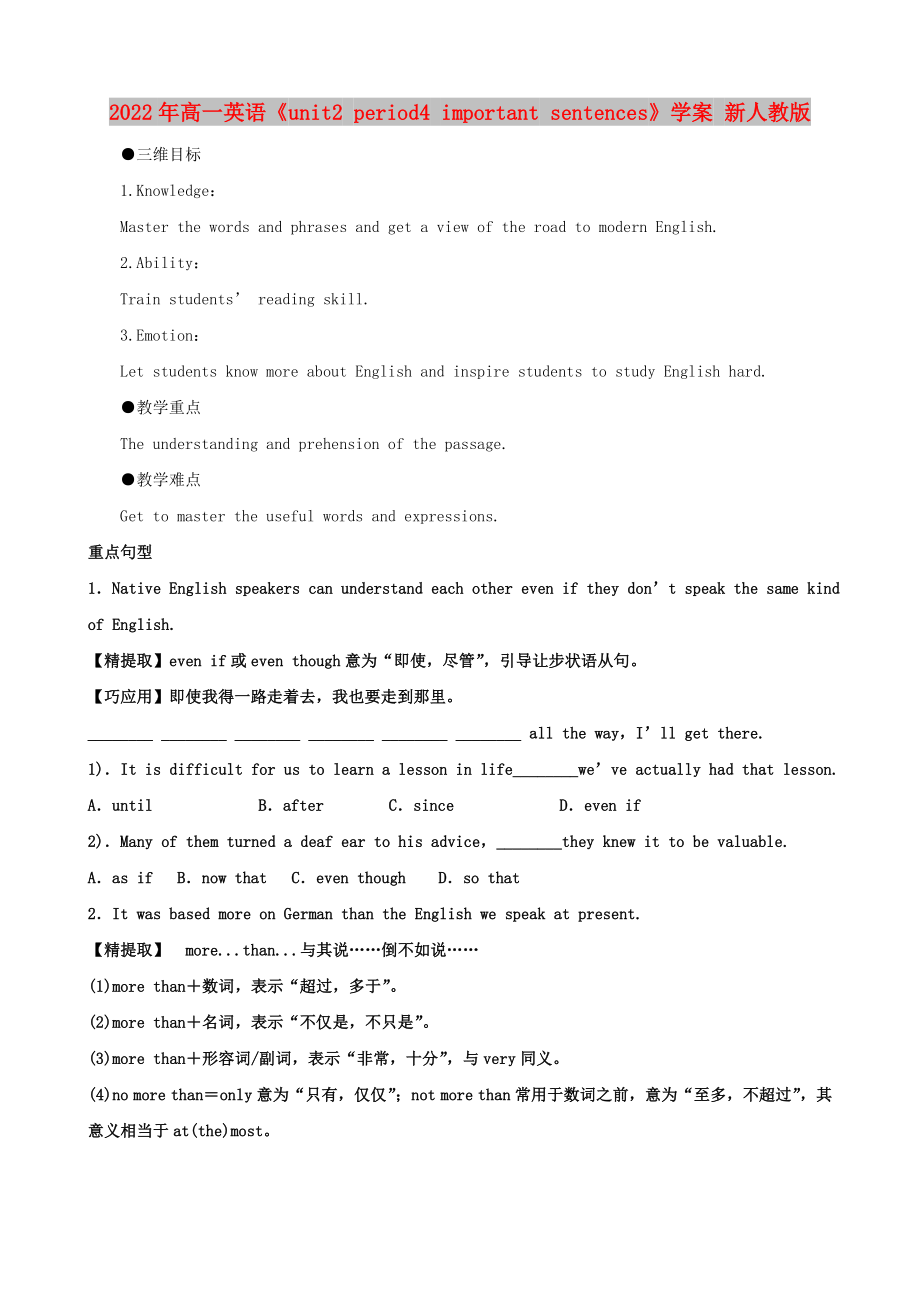《2022年高一英語(yǔ)《unit2 period4 important sentences》學(xué)案 新人教版》由會(huì)員分享�����,可在線(xiàn)閱讀����,更多相關(guān)《2022年高一英語(yǔ)《unit2 period4 important sentences》學(xué)案 新人教版(2頁(yè)珍藏版)》請(qǐng)?jiān)谘b配圖網(wǎng)上搜索�。
1、2022年高一英語(yǔ)《unit2 period4 important sentences》學(xué)案 新人教版
●三維目標(biāo)
1.Knowledge:
Master the words and phrases and get a view of the road to modern English.
2.Ability:
Train students’ reading skill.
3.Emotion:
Let students know more about English and inspire students to study English hard.
●教學(xué)重點(diǎn)
The u
2�、nderstanding and prehension of the passage.
●教學(xué)難點(diǎn)
Get to master the useful words and expressions.
重點(diǎn)句型
1.Native English speakers can understand each other even if they don’t speak the same kind of English.
【精提取】even if或even though意為“即使����,盡管”�����,引導(dǎo)讓步狀語(yǔ)從句。
【巧應(yīng)用】即使我得一路走著去���,我也要走到那里��。
________ ________
3、 ________ ________ ________ ________ all the way��,I’ll get there.
1).It is difficult for us to learn a lesson in life________we’ve actually had that lesson.
A.until B.a(chǎn)fter C.since D.even if
2).Many of them turned a deaf ear to his advice,________they knew it to b
4、e valuable.
A.a(chǎn)s if B.now that C.even though D.so that
2.It was based more on German than the English we speak at present.
【精提取】 more...than...與其說(shuō)……倒不如說(shuō)……
(1)more than+數(shù)詞,表示“超過(guò),多于”�。
(2)more than+名詞,表示“不僅是�,不只是”�����。
(3)more than+形容詞/副詞,表示“非常,十分”���,與very同義。
(4)no more than=only意為“只有�,僅僅”���;no
5、t more than常用于數(shù)詞之前��,意為“至多���,不超過(guò)”,其意義相當(dāng)于at(the)most�。
【巧應(yīng)用】造成她不愉快的原因,與其說(shuō)是他所說(shuō)的話(huà)�����,倒不如說(shuō)是他的說(shuō)話(huà)方式���。
It was ________ ________ ________ ________ ________ ________ ________what he said that made her unhappy.
1).(xx年高考浙江卷)It took______ building supplies to construct these energy saving houses.It took brains��,
6�、too.
A.other than B.more than C.rather than D.less than
3.So by the 1600’s Shakespeare was able to make use of a wider vocabulary than ever before.
【精提取】 a+形容詞比較級(jí)+名詞
【巧應(yīng)用】 為了尋找更好的生活他去了美國(guó)。
He went to the USA ________ ________ ________ ________ ________ ________.
4.However�����,on TV and the
7��、radio you will hear differences in the way people speak.
【精提取】 the way+定語(yǔ)從句����,定語(yǔ)從句的引導(dǎo)詞在從句中作狀語(yǔ)時(shí)����,可用that��,in which�,也可以省略����。
【巧應(yīng)用】 我不喜歡你嘲笑她的那種方式。
I don’t like ________ ________ ________ ________ ________ ________ ________ ________ .
5.So people from the mountains in the southeastern USA speak with almo
8、st the same dialect as people in the northwestern USA.
【精提取】 the same(...)as...和……一樣����;與……相同。same前總帶定冠詞���。
【巧應(yīng)用】 你能給我買(mǎi)一本和你昨天給湯姆的那本一樣的書(shū)嗎�����?
Could you buy me ________ ________ ________ ________ ________ ________Tom yesterday?
3課文佳句背誦與仿寫(xiě) (旨在培養(yǎng)對(duì)難句的理解和寫(xiě)作能力)
【原句】English is also spoken in Singapore and Mala
9��、ysia and countries in Africa such as south Africa. 在新加坡�����,馬來(lái)西亞和非洲其他國(guó)家��,比如南非�,人們也說(shuō)英語(yǔ)��。
[模仿要點(diǎn)] 列舉三者以上事物的表達(dá)
【模仿1】下課后我喜歡去踢足球�����,打籃球和參加一些有趣的活動(dòng)如唱歌跳舞
___________________________________________________________________________hHomework
Memorize the language points.
 2022年高一英語(yǔ)《unit2 period4 important sentences》學(xué)案 新人教版
2022年高一英語(yǔ)《unit2 period4 important sentences》學(xué)案 新人教版

